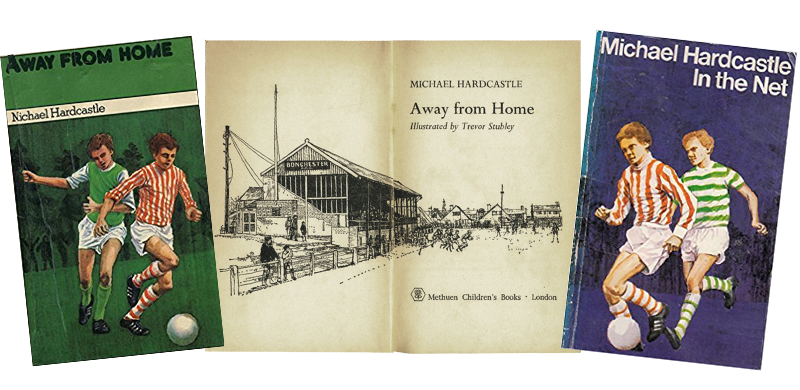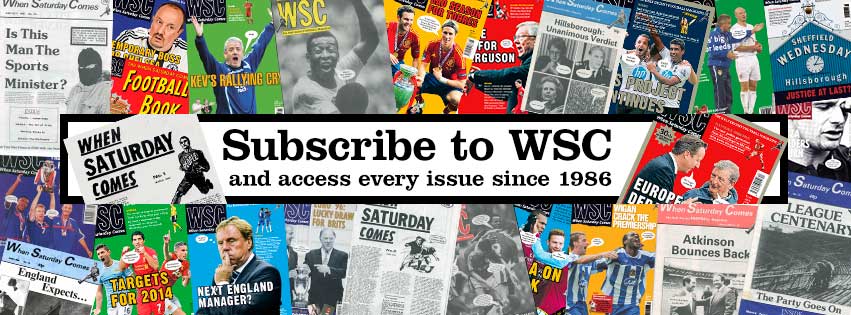
From tales of £1 transfers to the difficulties of ambitions, friendships and rivalries, Hardcastle’s writing remains unfussy and heart-warming, as Marcus Davies explained in WSC 288, February 2011
22 May ~ I recently bought one of the Jamie Johnson teen football novels by Dan Freedman for my nephew’s tenth birthday and a cracking good story it was too. It reminded me of the equivalent books by Michael Hardcastle that I read, and collected, so avidly back in the 1970s. Unfortunately, between the ages of 12 and 45 I must have mislaid my Hardcastle collection. No matter, that is what Ebay was made for – I bought them all.
I waited a week and then they started to arrive. First to drop through the letterbox was In the Net. It was the book I remembered most vividly – it featured the story of Gary Ansell and his struggles to play local football against the wishes of his family. His father, Godfrey, was a rugby man and had no truck with football types kissing and cuddling after every goal. “Rugby’ll make a man of you. It’s a man’s game. Soccer is for softies,” is what his dad says. And I feel Gary’s pain when he ends up on the rugby field at school instead of the football pitch where he truly belongs, I had the same injustice at my rugby-loving comprehensive – I was Gary Ansell.
When Godfrey’s old rugby pal, Ted Yates, turns up and informs him that his son is a football genius and he should be proud, I almost punched the air with vicarious pleasure for Gary. Godfrey even turns out to become one of Bank Vale United’s most vociferous supporters, but then it’s over. I read the whole book in about three quarters of an hour maximum, but I’m sure it took the whole of a school term to get through back in 1976.
Next to arrive was Away from Home, which follows the boys on a three-match tour – they don’t go far on their “motor coach” – just 100 miles to Bonchester. Reading these books again some 30 or more years later I was struck by the old-fashioned phraseology. There is an incredible amount of “rotten luck”, “hard lines” and “stinking homework to be done”, but the books have a tremendously simple and unfussy description of the action that still works just as well today. “As his opponents came in Gary passed to Kevin who fired a shot at goal. The ball struck the base of a post and bounced back to Gary’s feet. Without any hesitation Gary slammed it into the net. United 2, Beltisham 0.”
By the time Free Kick and Soccer Special arrived I realised that it wasn’t just the writing I was waiting for, but the pictures too. Each book has a dozen illustrations drawn by the Yorkshire-born artist Trevor Stubley and the drawings have a fabulous confidence and economy of line – he often used his own sons as models for the illustrations. The drawings are totally convincing and I loved them for bringing the action to life.
The books generally deal with the difficulties of ambitions, friendships and rivalries within a group of boys. In an interview recorded in 2007 for his old school, Michael Hardcastle MBE (awarded in 1988) outlined his technique for writing the series. Firstly, he liked the books to start straight into the action in order to grip the reader. Secondly, he liked to have a good sense of the three main characters. Thirdly, he always wanted to have a rough idea of how the plot would end. Then he would write, on a typewriter, between 500 and 1,000 words a day, with very little in the way of rewriting, this being a legacy of his journalistic background, where it was imperative to get things correct first time.
The solution of issues in each book is decent and honourable, but the stories are not always predictably resolved. In United (the fifth book to arrive) a troublesome but talented player, Nick Abel-Smith, is lured to the team on a big-money transfer of £1 but soon demands extra money for playing and wants to take over the captaincy. He eventually leaves but the rest of the players stay “United”, only to lose the ensuing cup tie.
The moral of the story seems to be that it’s better to stay loyal and feel good about oneself, even if it does mean losing. This is probably not a favourite read among current Premier League players. Mind you, looking around my trophyless shelves, I can’t help wondering if my own rather disappointing footballing career wasn’t somehow adversely shaped by reading these books. Marcus Davies
This article first appeared in WSC 288, February 2011. Subscribers get free access to the complete WSC digital archive – you can find out more details here
